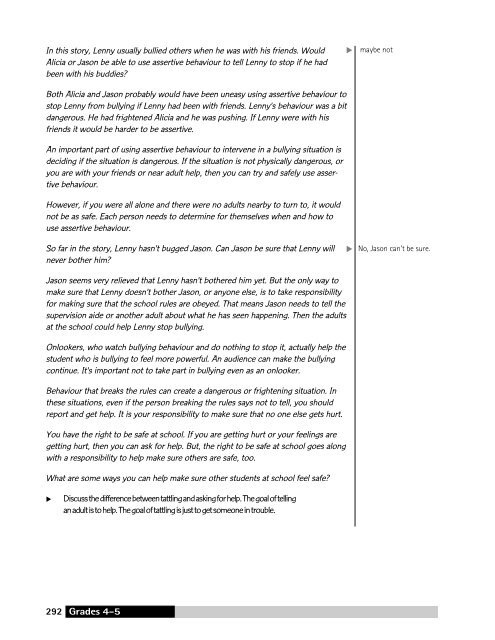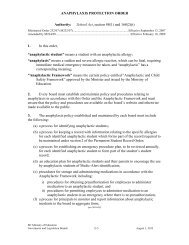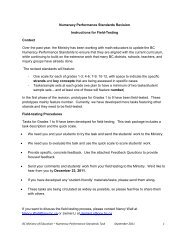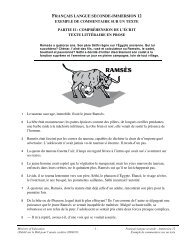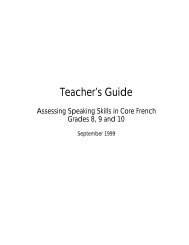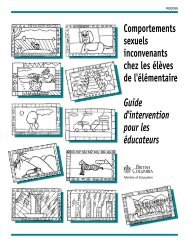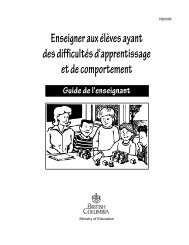- Page 3:
The B.C. Safe Schools Initiative Th
- Page 6 and 7:
A Note about the Cover The children
- Page 8 and 9:
LESSON PLANS Kindergarten .........
- Page 11 and 12:
Acknowledgments F ocus on Bullying:
- Page 13:
INTRODUCTION
- Page 16 and 17:
In a school free of bullying, langu
- Page 18 and 19:
through the development and impleme
- Page 21 and 22:
The Nature of Bullying in Elementar
- Page 23 and 24:
Bullying Behaviours Forms of Bullyi
- Page 25 and 26:
Children who bully others often bel
- Page 27 and 28:
Kids are have the power to stop bul
- Page 29:
Many communities are fortunate to h
- Page 33 and 34:
Step 1:Establish a Working Group St
- Page 35 and 36:
Step 1: Establish a Working Group t
- Page 37 and 38:
The Do’s of Collaborative Problem
- Page 39 and 40:
Step 2: Involve Parents Step 2 incl
- Page 41 and 42:
� Ask parents for their ideas con
- Page 43 and 44:
Focus on Bullying
- Page 45 and 46:
Focus on Bullying
- Page 47 and 48:
Focus on Bullying
- Page 49 and 50:
Focus on Bullying
- Page 51 and 52:
Step 3: Involve Students Step 3 inc
- Page 53 and 54:
Action Checklist Step 3: Involve St
- Page 55 and 56:
A Code of Conduct is a description
- Page 57 and 58:
Action Checklist Step 4: Create a S
- Page 59 and 60:
All school staff, including supervi
- Page 61 and 62:
� Design several types of tickets
- Page 63 and 64:
Step 6 includes the following proce
- Page 65 and 66:
Often, first responders may have in
- Page 67 and 68:
alternative, acceptable behaviours.
- Page 69 and 70:
Action Checklist Step 6: Develop a
- Page 71 and 72:
Consider distributing written summa
- Page 73 and 74:
� Conduct a “where are we with
- Page 75:
Action Checklist Step 7: Implement
- Page 79 and 80:
Is it Bullying? When observing stud
- Page 81 and 82:
Responding to a Bullying Incident F
- Page 83 and 84:
4. Follow-up Meet with the student
- Page 85 and 86:
The following steps form a comprehe
- Page 87 and 88:
Either the student’s teacher or p
- Page 89 and 90:
1. Describe the behaviour in terms
- Page 91 and 92:
� Responding to bullying incident
- Page 93 and 94:
3. Confront the student about the b
- Page 95 and 96:
Self-Reflection Activity Sheet (ada
- Page 97 and 98:
Restorative interventions: � focu
- Page 99 and 100:
One advantage of this approach is t
- Page 101 and 102:
Bullying Incident Report Responsibi
- Page 103:
Bullying Incident Report Steps Take
- Page 107 and 108:
Address Bullying Prevention through
- Page 109 and 110:
The lessons in this module will pro
- Page 111 and 112:
Safety and Injury Prevention � de
- Page 113 and 114:
students’ independent reading, as
- Page 115:
Focus on Bullying
- Page 119 and 120:
Module A: Defining Bullying Vocabul
- Page 121 and 122:
Vocabulary tattling: reporting to a
- Page 123 and 124:
Was Julie tattling when she went to
- Page 125 and 126:
Vocabulary bullying tattling What i
- Page 127 and 128:
In this story about Lee and Sam, wh
- Page 129 and 130:
Vocabulary bullying Materials � c
- Page 131 and 132:
� Go over some basic strategies t
- Page 133 and 134:
Vocabulary (in adult language) asse
- Page 135 and 136:
� Ask the students to “stand ta
- Page 137 and 138:
Module B: The School Plan Vocabular
- Page 139:
Now imagine that you come right up
- Page 142 and 143:
Lesson Script � If your school ha
- Page 144 and 145:
I’m going to read over the list y
- Page 146 and 147:
Lesson Script Everyone wants our sc
- Page 149 and 150:
Module C: Dealing With Bullying Voc
- Page 151 and 152:
You know how to be assertive. And y
- Page 153 and 154:
Materials � a pre-arranged visit
- Page 155:
� Have the principal or another s
- Page 158 and 159:
Lesson Script You know how to be as
- Page 161:
Lesson Plans Grade 1
- Page 164 and 165:
Lesson Script Have you ever heard s
- Page 167 and 168:
Vocabulary bullying behaviours bull
- Page 169 and 170:
Geoff started by saying Enrique was
- Page 171 and 172:
Vocabulary bullying bullying behavi
- Page 173:
Thank you for helping me learn abou
- Page 176 and 177:
Lesson Script In the last few days
- Page 178 and 179:
� Invite students to role play at
- Page 180 and 181:
158 Grade 1 Sort and Paste Names:__
- Page 182 and 183:
Lesson Script As you know, at our s
- Page 184 and 185:
Assessment Strategies ❑ Ask stude
- Page 186 and 187:
Lesson Script � If your school ha
- Page 188 and 189:
Additional Activities ❑ Assign st
- Page 190 and 191:
Lesson Script We’re going to talk
- Page 193 and 194:
Module C: Dealing With Bullying Voc
- Page 195 and 196:
Now let’s play a guessing game. H
- Page 197 and 198:
Materials � props, puppets, dolls
- Page 199:
Additional Activities ❑ Ask the s
- Page 202 and 203:
Lesson Script � Briefly review cl
- Page 204 and 205:
Additional Activities ❑ Have stud
- Page 207 and 208:
Module A: Defining Bullying Vocabul
- Page 209 and 210:
Behaviour that breaks the rules can
- Page 211 and 212:
Vocabulary bullying bullying behavi
- Page 213 and 214:
What are the different ways that Am
- Page 215:
Additional Activities ❑ Ask stude
- Page 218 and 219:
Lesson Script � Refer to the char
- Page 220 and 221:
198 Grades 2-3 Student Survey We wa
- Page 222 and 223:
200 Grades 2-3 Ways Students Get Al
- Page 224 and 225:
Lesson Script We have been talking
- Page 226 and 227:
If Raymond did nothing or was passi
- Page 228 and 229:
✄ ✄ ✄ ✄ ✄ ✄ 206 Grades
- Page 230 and 231:
Lesson Script Let’s recall what w
- Page 232 and 233:
Additional Activities ❑ Allow tim
- Page 234 and 235:
✄ ✄ ✄ ✄ ✄ ✄ ✄ ✄ 9.
- Page 237 and 238:
Module B: The School Plan Vocabular
- Page 239 and 240:
there is no bullying. We’ll think
- Page 241 and 242:
Vocabulary school statement rules c
- Page 243 and 244:
� Read the prepared chart of the
- Page 245 and 246:
Vocabulary consequences retaliation
- Page 247 and 248:
But, you might be afraid of being b
- Page 249 and 250:
Module C: Dealing With Bullying Mat
- Page 251 and 252:
Listen to the rest of the story. Th
- Page 253 and 254:
Vocabulary put-ups Materials � ch
- Page 255 and 256:
� Use a prop, or invite a student
- Page 257:
Think Positive Thoughts! Name:_____
- Page 260 and 261:
Lesson Script Today we’re going t
- Page 262 and 263:
✄ ✄ ✄ ✄ ✄ ✄ ✄ ✄ 1,
- Page 264 and 265: Lesson Script � Briefly review cl
- Page 267: Lesson Plans Grades 4-5
- Page 270 and 271: Lesson Script Today we are going to
- Page 272 and 273: � List these behaviours on the ov
- Page 275 and 276: Vocabulary bullying behaviours Mate
- Page 277 and 278: Additional Activities ❑ Students
- Page 279 and 280: 3. In which grades are the students
- Page 281: My Experiences with Bullying Behavi
- Page 284 and 285: Lesson Script Now we’re going to
- Page 286 and 287: ✄ 264 Grades 4-5 Sentence Strips
- Page 288 and 289: Lesson Script Today we’re going t
- Page 290 and 291: � As students role play in front
- Page 292 and 293: ✄ ✄ ✄ ✄ ✄ 270 Grades 4-5
- Page 295 and 296: Module B: The School Plan Vocabular
- Page 297 and 298: 3. True or false? It is not a your
- Page 299: True or False? 1. Bullying behaviou
- Page 302 and 303: Lesson Script We want to create a s
- Page 304 and 305: Assessment Strategy ❑ Have studen
- Page 306 and 307: Lesson Script � If the grade 6-7
- Page 308 and 309: Project Activity Students can choos
- Page 311 and 312: Module C: Dealing With Bullying Voc
- Page 313: Now let’s talk about Jason, an on
- Page 318 and 319: Lesson Script Now we are going to l
- Page 321 and 322: Vocabulary put-downs put-ups deflec
- Page 323 and 324: This time, Marc made a comment that
- Page 325: Snappy Responses Worksheet Names: _
- Page 328 and 329: Lesson Script We’ve been talking
- Page 331: Lesson Plans Grades 6-7
- Page 334 and 335: Lesson Script Today we are going to
- Page 336 and 337: How do you think LeAnn is feeling?
- Page 338 and 339: Additional Activities ❑ Have stud
- Page 340 and 341: Story 3 William seems to get into t
- Page 342 and 343: 320 Grades 6-7 Vocabulary Match Nam
- Page 344 and 345: Lesson Script I am going to start t
- Page 346 and 347: Additional Activity ❑ Choose from
- Page 348 and 349: Survey Activity Begin with a brief
- Page 350 and 351: 3. In which grades are the students
- Page 353 and 354: Vocabulary (in adult language) pass
- Page 355 and 356: Let’s chart some natural phrases
- Page 357: ✄ ✄ ✄ ✄ ✄ Role Play Cards
- Page 360 and 361: Lesson Script � Discuss the pre-s
- Page 362 and 363: Additional Activities ❑ Ask the s
- Page 364 and 365:
Lesson Script At our school we have
- Page 366 and 367:
❑ Have students develop and make
- Page 368 and 369:
Lesson Script In today’s lesson w
- Page 370 and 371:
You have the right to be safe. But
- Page 372 and 373:
Lesson Script Last lesson we talked
- Page 374 and 375:
� Evaluate the consequences of ea
- Page 376 and 377:
Story Analysis Activity Divide the
- Page 378 and 379:
356 Grades 6-7 Strategies for Deali
- Page 380 and 381:
Lesson Script We have already pract
- Page 383:
RESOURCES
- Page 386 and 387:
Browne, Anthony. 1995. Willy the Ch
- Page 388 and 389:
Elliott, Michele. 1997. The Willow
- Page 390 and 391:
Kemp, Gene. 1990. Just Ferret. New
- Page 392 and 393:
Shreve, Susan. 1997. Joshua T. Bate
- Page 394 and 395:
Healthy Schools Project This projec
- Page 396 and 397:
Garrity, C., Jens, K., Porter, W.,
- Page 398 and 399:
Pearce, Dr. John. 1989. Fighting, T
- Page 400 and 401:
Dauber, S.L., and Epstein, J.L. 199
- Page 402 and 403:
Sharp, Sonia and Peter K. Smith. 19


